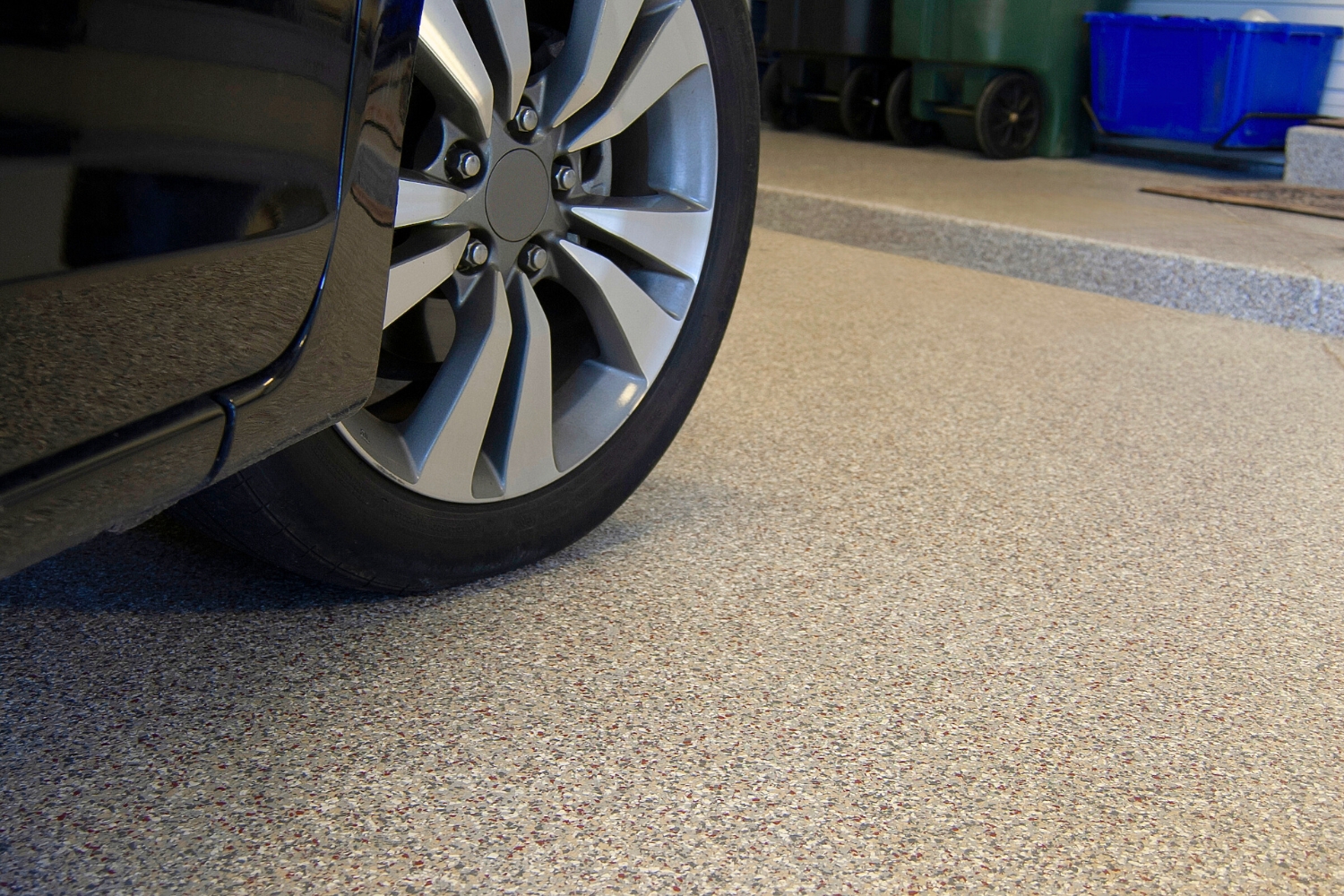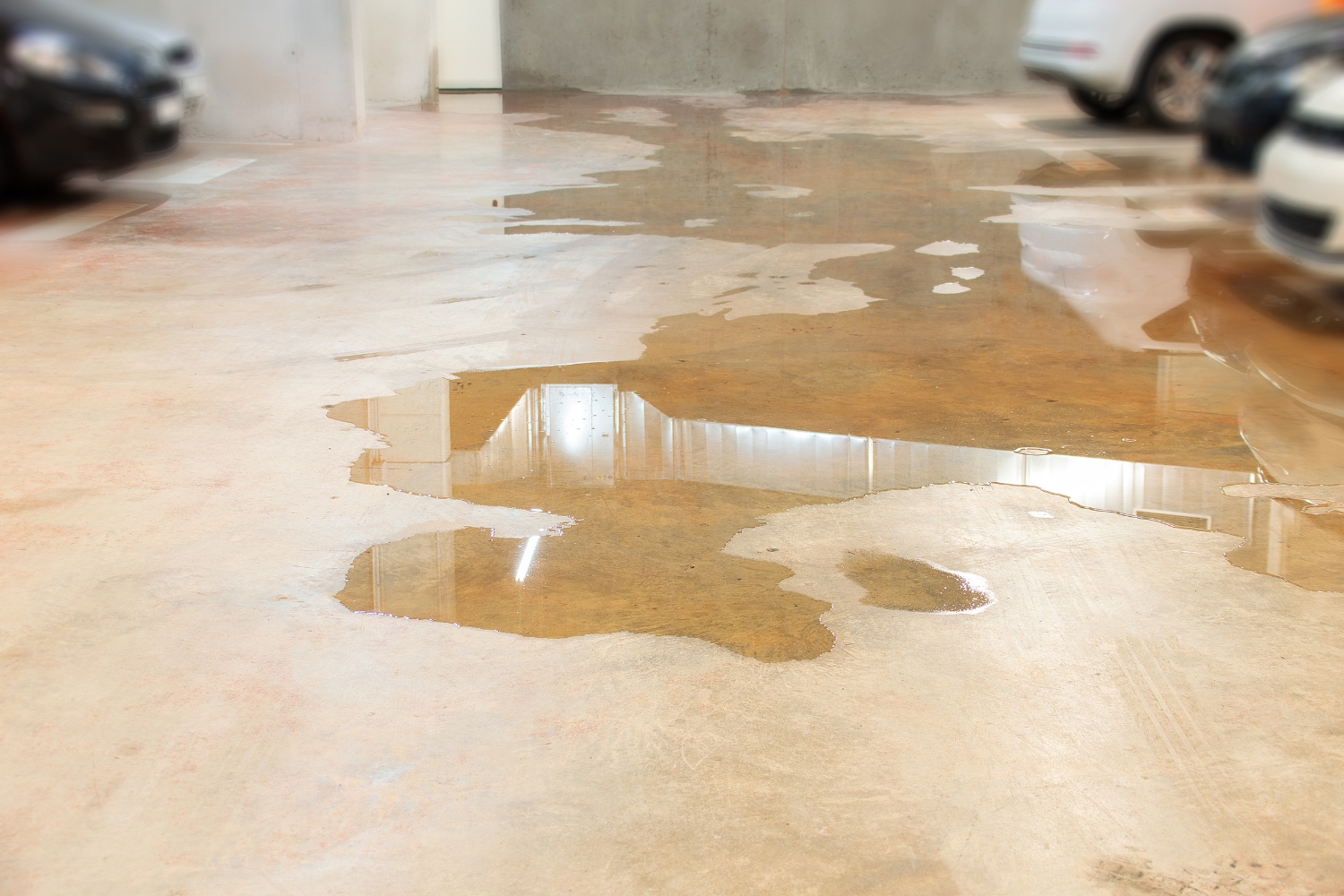Your garage is a multifunctional space. But without waterproofing your floors, you risk various damages, including cracks, mold, and costly repairs. Whether you use your garage for storage, own a commercial parking garage, or a DIY home gym, its floor requires water-resistant coating or a new application to prevent these potential issues.
But, with many types of garage flooring materials available, it can be challenging to know which to choose.
Learn more about the best waterproof garage floors and why they’re worth the investment for your home or business.
6 Types of Waterproof Garage Floors
Don’t risk ruining your personal belongings or out-of-pocket business costs from water-related damages in your garage. Below are the six best waterproof garage floors to preserve their functionality and support your needs.
1. Polyaspartic Garage Floor Coating

Polyaspartic coating is a mixture of polyaspartic ester and other materials and is considered one of the most durable waterproof flooring options. It acts as a protective barrier against water by applying a layer on top of your garage floor. Although it’s higher in cost around $4 to $10 per square foot (depending on your garage size and labor rates), polyaspartic protects your floors against various weather conditions.
Due to its strength and flexibility, polyaspartic is one of the best waterproof flooring coatings for your garage because it’s stain-resistant to rain, oil, gas, dirt, and more. If you work on your car in the garage or if it’s exposed to wide temperature ranges, direct sunlight, and UV radiation, polyaspartic is worth the price for the vast protection it provides.
2. Epoxy Garage Floors
Epoxy coating is made of epoxy resin and polyamine hardener. If you want the benefits of a waterproof garage floor and aesthetics, epoxy is ideal because you can pick from various colors, types, styles, and is water-resistant. From metallic to quartz and flake patterns, you have diverse designs to choose from.
The three main types of epoxy include:
- Water-Based Epoxy: Uses water-based solvents over standard acetone or mineral spirits for a sustainable material option at a lower price. It’s waterproof, non-toxic, and easy to clean.
- Solvent-Based Epoxy: Has stronger water-resistant properties against chemicals, moisture, and abrasion compared to water-based epoxy. It’s ideal for heavy-duty applications.
- Solid Epoxy: Offers long-lasting chemical-resistance strength since it’s the most concentrated and undiluted type of epoxy. It typically has the highest costs.
Depending on the type of epoxy coating, total garage square footage, and labor, the average costs can range from $2 to $10 per square foot.
3. PVC Garage Floor Tiles
PVC garage floor tiles are one of the best water-resistant flooring materials because of their raised structure. This design allows them to block water absorption and promote air circulation underneath them. It protects against moisture buildup and dries water faster, preventing mold and mildew growth.
They’re also resistant to oil, gas, and most solvents, which is practical if you work on your car in the garage. It offers diverse designs and textured surfaces, allowing more traction and non-slip grips for commercial and industrial applications. The average costs range from $4 to $8 per square foot, excluding labor.
4. Polypropylene Garage Floor Tiles
Polypropylene tiles are made of plastic and are ideal for heavy-duty applications to reduce wear and tear because of their traction strength. They’re not only waterproof but also strong enough to withstand high traffic and heavy vehicles.
These tiles also come in raised designs to promote air circulation and dry quickly to prevent moisture buildup. They’re simple to install and remove, with average costs ranging from $6 to $10 per square foot.
5. Interlocking Floor Tiles/Mats
Interlocking floor tiles and mats are ideal if you have a makeshift garage gym at home. They’re comfortable on your feet, available in stylish designs, are water-resistant, and extremely durable against stains and scratches from heavier objects. However, if you have a vehicle in your garage, you must use vulcanized rubber flooring to prevent it from retaining moisture.
The tile or mat edges interlock like puzzle pieces to custom-fit your garage floor. They can be made of plastic PVC, rubber, non-absorbent carpet, or vinyl. Depending on the materials, average costs range from $3 to $7 per square foot.
6. Rubber Garage Floors
While rubber is a type of garage flooring that is waterproof, there are best-use applications. Rubber garage floors aren’t designed to withstand vehicles as they bunch up from heavier weight.
If you’re using your garage primarily for storage, rubber flooring provides effective water protection and is easy to install. Depending on material thickness, average costs can range from $2 to $7 per square foot.
Garage Floor Water Damage: Causes, Signs, & Risks

There are many cost-related risks associated with a wet garage floor that doesn’t have waterproof materials. Depending on the severity, the average water damage restoration costs can range from $450 to $13,000. That’s why it’s crucial to invest in durable garage flooring solutions that are cheaper than the price to repair water-related issues in the long run.
Below are some of the most common causes of water damage from unprotected garage flooring with tips to prevent them:
Poor Air Circulation
Improper garage air circulation builds up moisture and contributes to water damage on your floors, like mold and mildew. Using fans during humid and wet seasons or periodically opening your garage doors during non-extreme weather conditions can help circulate air.
Wet Weather Conditions
Rain, snow, high humidity, melted ice, and road salt can be dragged into your garage by vehicles and shoes. Using mats to wipe your feet or shoe covers can help reduce bringing moisture onto your garage floor.
No Weatherproofing
A lack of weatherstripping doors and windows contributes to water floor damage, especially in regions with extremely wet and cold climates. Weatherproofing these areas can seal out rain and moisture from seeping inside.
Improper Cleaning Chemicals
Not all cleaning chemicals are meant for specific garage flooring materials and can cause liquid stains from improper use. Ensure you use material-specific cleaning chemicals to prevent these liquid-based stains.
Accidental Spills
Spilling accidents, like broken grocery bags, dropping coffee, and vehicle liquids/oil leaks are common. While accidents aren’t always avoidable, having water-resistant flooring in your garage can prevent stains and moisture buildup.
Safeguard Your Garage Floor from Soaking
We don’t expect you to be an expert in garage floors. At Showroom Garage Flooring, our team can help you determine which waterproof flooring material is best for your garage and unique needs.
As a home or business owner, it’s critical that you hire professionals for floor coating and applications to maximize your water protection and prevent related damages. We stand behind our quality workmanship with lifetime warranties for any brand-new flooring and 24-hour turnaround times.
Ready to floodproof your garage floors?
Learn more about our garage flooring services or contact us for a free onsite assessment and consultation today!

